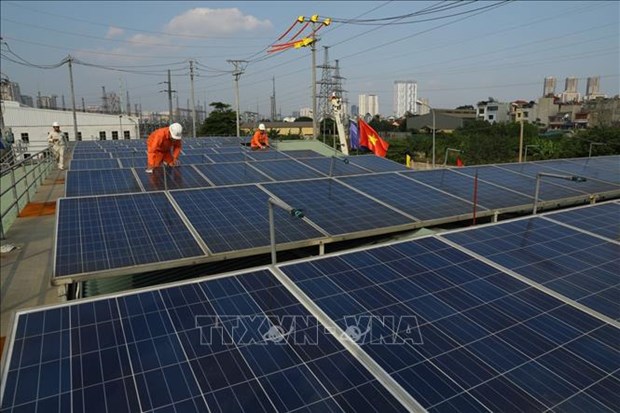
Solar panels on the roof of a building (Photo: VNA)
Hanoi (VNA) – Vietnam Electricity (EVN) has proposed several ways to tackle problems related to rooftop solar power development, especially in the context that there are few legal guidelines to regulate the highly necessary sector.
In Document No. 3158/TTr-EVN recently submitted to its Members’ Council, the State-owned group pointed out there is currently no clear legal basis for connecting rooftop solar power systems with the national grid as well as the establishments where they are installed for self-consumption.
It said in the recent past, EVN and subsidiaries received opinions from investors and the community regarding the temporary suspension of connecting rooftop solar power systems with the grid pending Government issuance of mechanisms and the Ministry of Industry and Trade’s guidance for implementation.
Foreign investors and domestic organisations guaranteed by foreign investors or international development funds asked for permission to use their own rooftop solar systems.
For example, the Norsk Solar Vietnam Co. Ltd, guaranteed by investors and development funds of the Norwegian and Finnish Governments, asked for permission to use rooftop solar power systems for industrial parks, factories, and shopping malls. The Maruha Chemical Vietnam Co. Ltd of Japan’s Toray group also wants to install a solar system for use at its facilities.
As these systems would be installed outside the EVN grid, a negative response may be in the winds if investors are not permitted to plug in to their own solar systems, EVN said.
However, it noted, there are risk for loopholes in the system if EVN agrees. Regulations on procedures, standards, and technical requirements for the self-use of those systems has yet to be developed.
Lack of control over rooftop solar power may lead to difficulties in mobilising other power sources and ensuring supply - demand balance. This is especially so in the central and southern regions, when those systems break down or are unable to meet investor demand. Therefore, it is necessary to have a legal corridor to hold users responsible for their consumption, according to EVN.
The group said it has recommended the Government issue mechanisms for encouraging the development of rooftop solar power in the northern region, but neither the Government nor the Ministry of Industry and Trade has released guidance.
To create a favourable business climate for investors and help boost Vietnam’s cooperation with other countries, EVN is seeking its Members Council's permission to urge the ministry to issue detailed regulations to govern solar power systems, with priority given to the northern region.
It noted it will also propose the Ministry of Construction promulgate all-round regulations on technical standards and requirements related to the safety of buildings when installing the systems.
The EVN document also suggested ways to resolve disagreements about procedures for households and individuals to register for rooftop solar power trading. Accordingly, electricity companies are asked to pay for rooftop solar power to the households and individuals who do not have to register for trading this type of electricity because of low incomes.
As part of Vietnam’s efforts to boost renewable energy, EVN will invest more in clean energy in the years to come to meet growing demand.
The group has submitted to the Government proposals on mechanisms to encourage the development of renewable energy such as wind and solar power along with storage systems.
It has also asked for the Cabinet’s permission to develop offshore wind power in the northern region to increase electricity supply and ensure national power security.
EVN hopes to put into operation around 5,500 MW of electricity from renewables, with 4,000 MW from wind power and 1.500 MW from solar power by 2025, to prevent power shortages, especially in northern localities./.